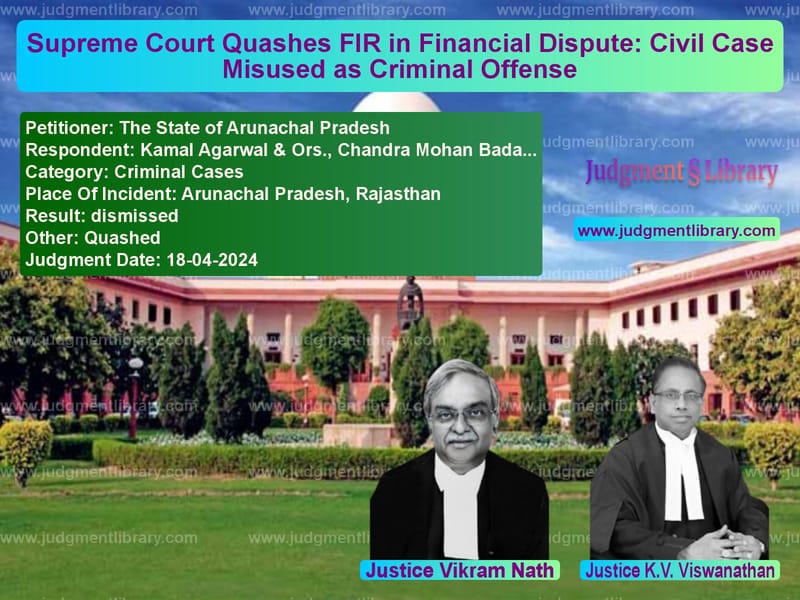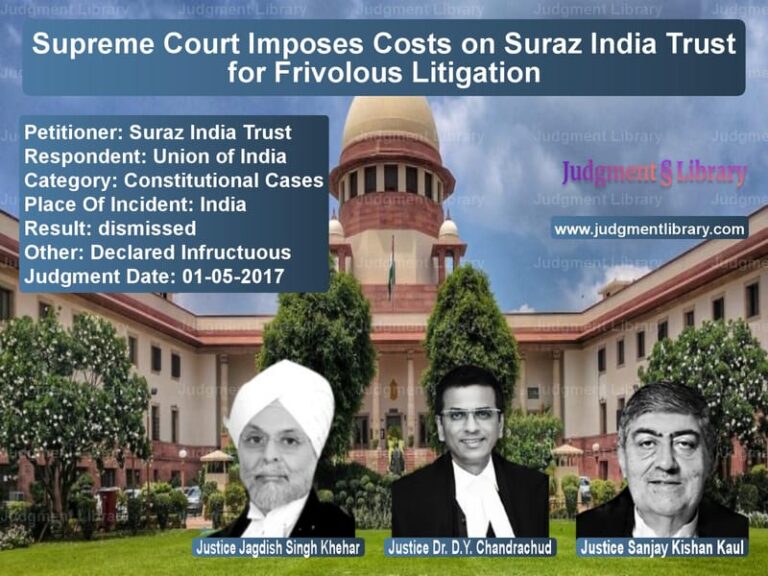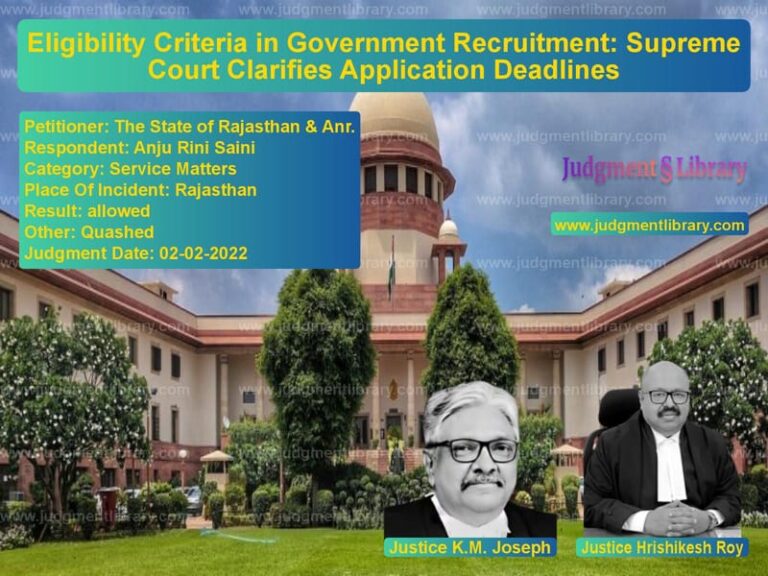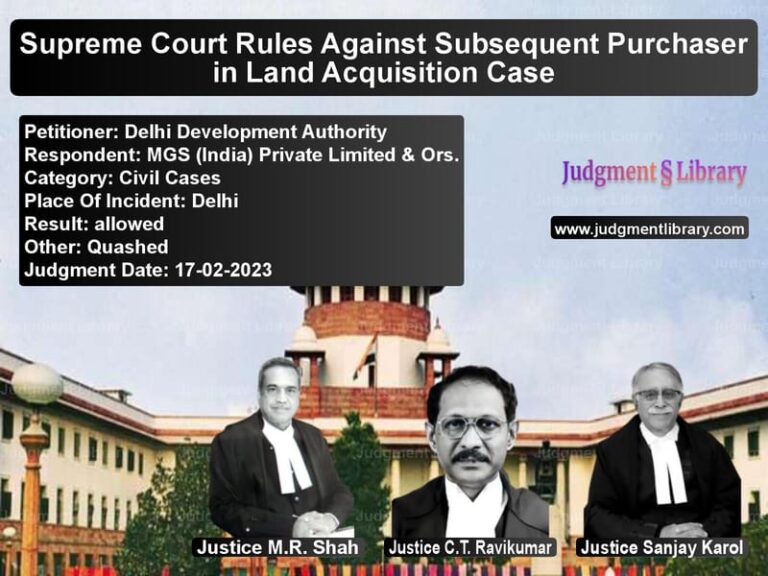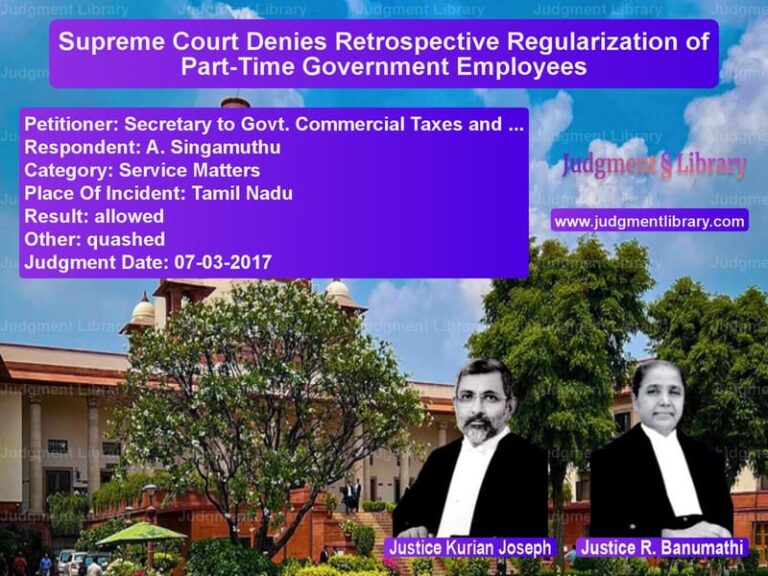Supreme Court Quashes FIR in Financial Dispute: Civil Case Misused as Criminal Offense
The case of The State of Arunachal Pradesh vs. Kamal Agarwal & Ors. and Chandra Mohan Badaya vs. The State of Arunachal Pradesh presents an important legal question regarding the misuse of criminal law in a dispute fundamentally of a civil nature. The Supreme Court had to determine whether a financial transaction involving land purchases, allegedly turned fraudulent, should be treated as a criminal case or resolved through civil litigation.
The judgment underscores a critical legal issue: whether a mere financial dispute, without evidence of fraudulent intent, can be classified as cheating under Section 420 IPC. Additionally, the case involved territorial jurisdiction concerns, as the transactions and accused were based in Rajasthan, but the FIR was filed in Arunachal Pradesh. The Supreme Court ultimately quashed the FIR, ruling that the case lacked criminal intent and belonged in civil court.
Background of the Case
The case originated from a financial transaction between M/s Shiv Bhandar and the accused parties. In 2016, Rs. 1 crore was transferred in four installments to various accounts linked to the accused. The complainant, Anil Agarwal, alleged that this amount was meant as an advance payment for the purchase of land in Jaipur, Rajasthan, but the accused failed to deliver the promised property.
The accused, however, maintained that the amount was given as a loan and not a property advance. They also claimed that part of the amount had been repaid and that they had transferred two properties to the complainant’s family members as compensation. The dispute over the nature of the transaction escalated, leading the complainant to file an FIR in Arunachal Pradesh in 2017 under Sections 420 (cheating) and 120B (criminal conspiracy) of the Indian Penal Code.
Key Legal Issues
- Whether a financial dispute involving alleged non-delivery of property could be treated as a criminal offense under IPC Section 420 (cheating).
- Whether Arunachal Pradesh had the territorial jurisdiction to register the FIR when all the accused and properties were based in Rajasthan.
- Whether the complainant’s allegations established a prima facie case of fraud or merely pointed to a civil dispute over financial transactions.
Arguments by the Appellant (State of Arunachal Pradesh)
The State of Arunachal Pradesh, challenging the Rajasthan High Court’s decision to quash the FIR, argued:
“The accused persons received Rs. 1 crore in four installments and failed to deliver the promised property. This constitutes cheating under Section 420 IPC.”
The State contended that the financial loss suffered by the complainant demonstrated fraudulent intent by the accused, thereby justifying the criminal charges.
Arguments by the Respondents
The accused countered that:
“The transaction was purely civil in nature, involving a financial arrangement without a written contract. The FIR was a misuse of criminal law to exert pressure.”
They also highlighted that all relevant transactions, including the bank transfers and property transfers, occurred in Rajasthan, making Arunachal Pradesh an improper jurisdiction for the case.
Supreme Court’s Analysis
The Court noted that the dispute was fundamentally a civil matter involving financial dealings. It observed:
“A simple reading of the FIR itself does not disclose any cognizable offense. The allegations revolve around financial transactions and property transfers, which should have been addressed through civil litigation.”
The Court also questioned why the complainant did not appeal against the Rajasthan High Court’s quashing of the FIR, stating:
“Why has the State of Arunachal Pradesh pursued this matter when the complainant did not challenge the Rajasthan High Court’s decision?”
Jurisdictional Issues
A crucial aspect of the case was the question of jurisdiction. The accused argued that since the entire financial transaction and property in question were located in Rajasthan, the Arunachal Pradesh police had no authority to investigate the case. The Supreme Court agreed, noting that the complainant’s only connection to Arunachal Pradesh was the location of his business.
On this basis, the Court held:
“The Rajasthan High Court rightly found that no part of the cause of action arose in Arunachal Pradesh. The police and courts in Arunachal Pradesh lacked territorial jurisdiction.”
Final Judgment
The Supreme Court quashed the FIR and all related proceedings, ruling that the dispute was civil in nature and did not warrant criminal charges. It also criticized the misuse of criminal proceedings in such financial matters.
Judgment Date: April 18, 2024
Judges: Vikram Nath, K.V. Viswanathan
Petitioner Name: The State of Arunachal Pradesh.Respondent Name: Kamal Agarwal & Ors., Chandra Mohan Badaya.Judgment By: Justice Vikram Nath, Justice K.V. Viswanathan.Place Of Incident: Arunachal Pradesh, Rajasthan.Judgment Date: 18-04-2024.
Don’t miss out on the full details! Download the complete judgment in PDF format below and gain valuable insights instantly!
Download Judgment: the-state-of-arunach-vs-kamal-agarwal-&-ors.-supreme-court-of-india-judgment-dated-18-04-2024.pdf
Directly Download Judgment: Directly download this Judgment
See all petitions in Fraud and Forgery
See all petitions in unfair trade practices
See all petitions in Judgment by Vikram Nath
See all petitions in Judgment by K.V. Viswanathan
See all petitions in dismissed
See all petitions in Quashed
See all petitions in supreme court of India judgments April 2024
See all petitions in 2024 judgments
See all posts in Criminal Cases Category
See all allowed petitions in Criminal Cases Category
See all Dismissed petitions in Criminal Cases Category
See all partially allowed petitions in Criminal Cases Category

